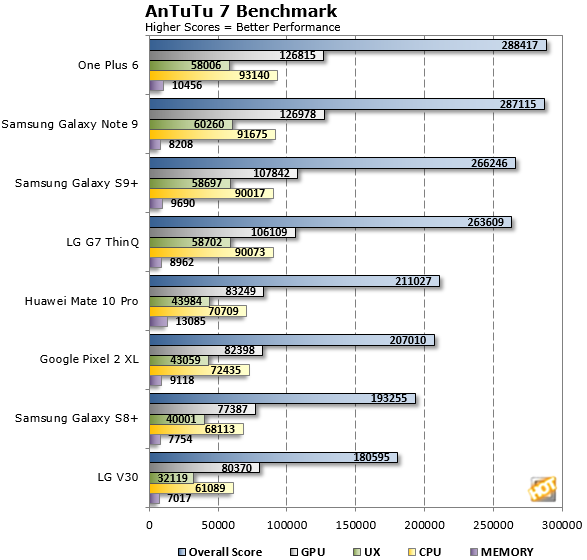A Note On Throttling, Or Lack Thereof
Before we dive into our performance benchmarks, there's an advantage the Galaxy Note 9 has currently, perhaps versus many other phones on the market, and that is that it sustains its performance over time and extended use. Samsung claims the new Galaxy Note 9 has a 3X larger heat spreader and a "carbon-water" cooling system. This may sound like a bit of marketing hype but
a recent teardown did show the Note 9 is much better-equipped than its predecessor. Furthermore, our own
recent Benchmark Bake-Off of the Galaxy Note 9 versus the OnePlus 6 proves out Samsung's claim that the Note 9 does not throttle, at least not to any significant degree. However, other phones (like the OnePlus 6, though we love that device - review inbound) can bleed off as much as 5 - 10 percent performance over time due to thermal saturation. In fact, it has forced us to rethink our testing methodology moving forward to include some extended use benchmarking, to look for thermal throttling conditions in handsets. Again, our
Benchmark Bake-Off is a quick read and worth your time.
Good benchmark practice dictates running an app at least two or three times for accuracy, but regardless, and bottom line, what you see for Galaxy Note 9 benchmark results on the pages ahead will be representative of their results after 1 run or the 10th run. This also speaks volumes for those of you who plan on breaking out
your best Fortnite over extended sessions on the new Galaxy Note 9.
For our first tests we're using the JetStream benchmark for
Javascript performance and RightWare’s Web Test 3.0 for comprehensive, mixed-media web performance analysis, including
HTML5 rendering. Here we'll primarily determine how the Galaxy Note 9's
Snapdragon 845 SoC handles this workload, along with the Android Oreo operating system and Chrome web browser...
 |
|
JetStream And Basemark Web 3.0 |
| JavaScript and Browser Testing |
|


Here the Samsung Galaxy Note 9 puts up the second best scores we've seen, just behind the OnePlus 6, which in the case of our unit sports 8GB of RAM, versus our Note 9's 6GB setup.
 |
|
Geekbench |
|
Synthetic CPU Testing |
|
In the GeekBench test, we're stressing only CPU cores in a handset (not graphics), with both single and multi-threaded workloads. The test is comprised of encryption processing, image compression, HTML5 parsing, physics calculations, and other general purpose compute processing.

Geekbench is a bit more strenuous and extended testing versus the other two above and the Galaxy Note 9 now moves into the lead spot, with the fastest Android phone score we've seen to date by just a hair in the multi-core test and just a hair behind the OnePlus 6 in the single-core test.
 |
|
Futuremark PCMark For Android |
|
General Purpose Pocket Computing Performance Metrics |
|
Futuremark's PCMark for Android is a new benchmark addition here for us, so we have fewer results in our database of tested phones to show you. However, this is an excellent suite of tests that we highly recommend for benchmarking performance of a handset with heavier-duty tasks for things like image and video editing, as well as lighter-duty workloads like email, and web browsing. When you see the test running live it's clear the scripted application tests are carefully selected and tuned to make use of the platforms involved in a very controlled way.
PCMark 10 is a lighter-duty sort of general use and productivity test, but there are some modules within the suite that are more taxing on devices, like the Video and Photo Editing tests, for example. Regardless, the Note 9 drops in the 3rd ranked spot here.
 |
|
AnTuTu 7 |
|
Platform Benchmarks |
|
AnTuTu’s latest benchmark returns a number of metrics ranked with somewhat nebulous scores, rather than frame rates or time to complete. We tested with the latest version of AnTuTu across all platforms including Android, iOS and even Windows Phone. AnTuTu returns four top level performance metric results that we are including here: CPU, RAM, 3D, UX (or User Experience), along with a total score.
The Samsung Galaxy Note 9 returns to trading blows with the OnePlus 6 here and its 8GB of RAM complement. One notable is that the Note 9 pulls up the best UX and GPU scores in the AnTuTu test suite, but trails a touch versus the newer phones with respect to memory performance.
We will say anecdotally that the Galaxy Note 9, in general, just feels snappy and responsive, never once playing catch-up to daily usage requests we would make of it.
Let's test some gaming and graphics applications, next...
AnTuTu’s latest benchmark returns a number of metrics ranked with nebulous scores, rather than frame rates or time to complete. We tested with the latest version of AnTuTu across all platforms including Android, iOS and even Windows Phone. AnTuTu returns four top level performance metric results that we are including here: CPU, RAM, 3D, UX (or User Experience), along with a total score.












